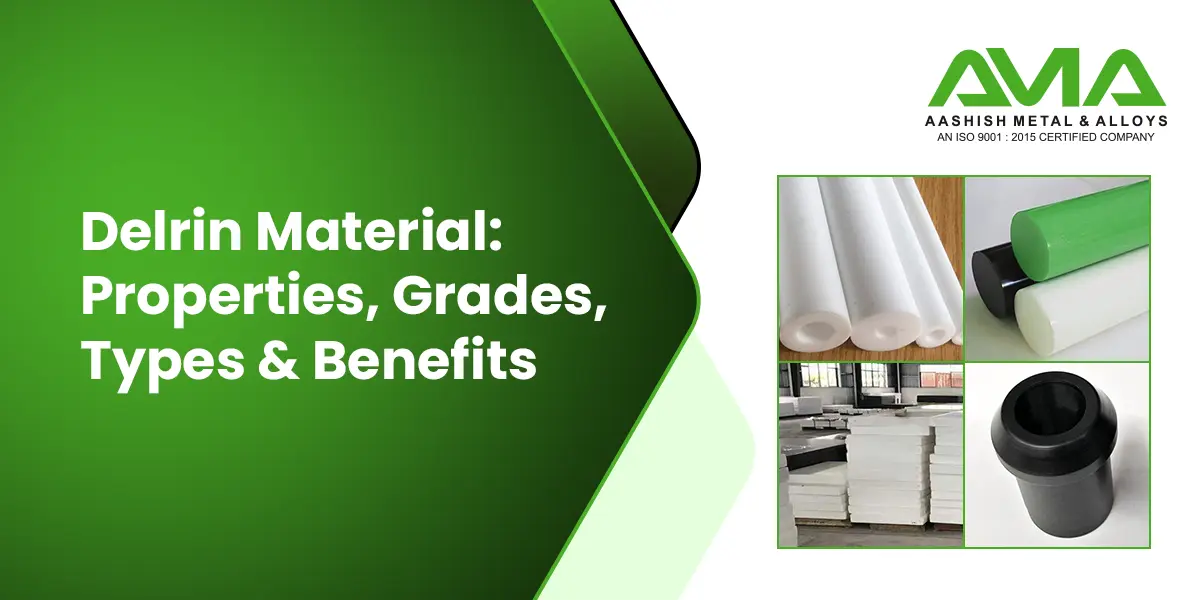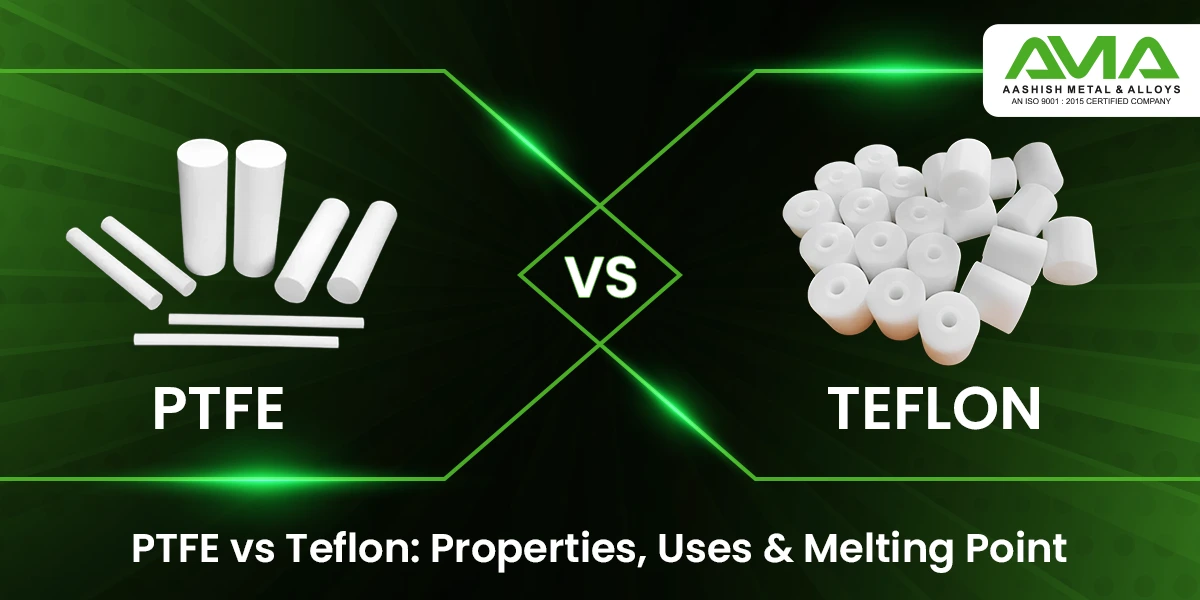In modern engineering and manufacturing, choosing the right material is important for making long lasting parts like gears, bearings, bushings, rods, sheets and tubes for machines, cars and industrial equipment. Delrin® has emerged as a trusted solution offering a rare combination of strength, durability and low friction that helps components perform smoothly and reliably. From industrial machinery to automotive systems, Delrin’s versatility allows designers and engineers to create precision parts that withstand wear, stress and environmental challenges, making it an essential material in today’s high-performance applications.
This article delves into the material properties, grades, benefits and types of Delrin products. Our resource will assist you in comprehending the composition of Delrin and the appropriate application for it, regardless of whether you are interested in CNC machining and injection molding
What is Delrin Material?
Polyoxymethylene (POM), also referred to as acetal or by its trade name Delrin®, is a high-performance engineering plastic known for its low friction, rigidity, and strong dimensional stability. POM belongs to the thermoplastic family and is available in a variety of formulations, each with slightly different characteristics. Therefore, it’s essential to understand the specific properties of each type before selecting one for a particular application.
Delrin® is a semi-crystalline thermoplastic commonly used for manufacturing components that require tight tolerances and precision. It is valued for its excellent dimensional consistency, low wear, and smooth sliding behavior. Delrin® also offers notable mechanical strength, a broad working temperature range (-40°C to 120°C) and overall robust performance.
Delrin Material Grades
Delrin® is available in various grades each is tailored with unique supplements and properties to suit specific industrial, automotive and engineering operations.
Delrin Material Grades
Delrin 150 is an acetal homopolymer grade known for its excellent thermal resistance, strength, and rigidity. Its high viscosity makes it suitable for extrusion processes. Parts manufactured from Delrin 150 remain dimensionally stable under mechanical stress and do not deform when exposed to temperature variations or humidity. In addition, it features a naturally low coefficient of friction, excellent wear resistance, and strong resistance to many chemicals.
Because of its durability and stability, Delrin 150 is widely used in demanding applications such as automotive components and construction equipment where consistent performance under load is critical.
Delrin 570
Delrin 570 is reinforced with 20% glass fibers, which significantly increases stiffness and strength. This grade is specifically designed to maintain dimensional accuracy even under heavy stress and impact. With its enhanced creep resistance and rigidity, Delrin 570 is commonly chosen for automotive and structural components where high performance under constant load is required.
Delrin 525 GR
Delrin 525 GR contains 25% glass reinforcement, offering greater stiffness and creep resistance than Delrin 570. This grade is highly machinable and well-suited for injection molding and other fabrication methods. It retains its strength and shape even under fluctuating temperatures and high pressures. Delrin 525 GR also provides outstanding fatigue resistance, chemical stability, electrical insulation, and self-lubricating properties.
These combined advantages make it ideal for a broad range of uses, from household appliances to precision electronics, automotive systems, and industrial machinery.
Delrin AF 100
Delrin AF 100 is blended with 13% PTFE fibers, which reduce friction and improve wear resistance while maintaining the strength and dimensional stability of the base acetal material. The PTFE fibers are evenly dispersed throughout the resin, giving the material a longer service life under sliding or high-friction conditions.
Its self-lubricating nature eliminates the need for additional oils or greases, making it an excellent choice for sanitary and dry-running applications, particularly in laboratory and industrial equipment.
Delrin 13% AF Blend
This grade is a 2:1 mixture of Acetal AF-100 and Acetal 150. The combination improves the material’s frictional properties, reducing wear and preventing stick-slip in high-speed applications. Despite being a blend, it retains about 90% of the base acetal’s strength while delivering superior sliding performance.
Delrin 13% AF Blend is commonly used for gears, bushings, springs, plates, and housings. Its ability to function without external lubrication also makes it suitable for food processing and other applications where contamination from oils must be avoided.
Delrin AF 500
Delrin AF 500 incorporates 20% PTFE fibers, which further enhance its wear and friction performance compared to AF 100. The evenly distributed fibers improve toughness, dimensional stability, and load-bearing capacity without compromising machinability. With its superior low-friction and low-wear characteristics, Delrin AF 500 is often applied in bearings, gears, and bushings where durability is essential.
Delrin AF DE588
Delrin AF DE588 also contains 20% PTFE reinforcement but is a specialized grade tested and approved by the U.S. Navy for use in demanding applications, including submarine components. It provides excellent stability, stiffness, and wear resistance, along with self-lubricating properties that ensure reliability in high-speed, load-bearing environments.
Types of Delrin Products
Delrin® is a versatile material that can be shaped into a variety of forms, each designed to meet specific engineering needs.
- Delrin Rods – Delrin rods are cylindrical bars made from acetal homopolymer, known for their high strength, rigidity, and low friction properties. They are widely used in machining applications to produce parts like gears, bushings, and bearings.
- Delrin Sheets – Delrin sheets are flat panels of acetal homopolymer that can be easily machined into various components. They offer excellent dimensional stability and are resistant to wear and chemicals, making them suitable for applications in automotive, aerospace and industrial sectors.
- Delrin Bushes – Delrin bushings are cylindrical components used to reduce friction and wear between moving parts. Their self-lubricating properties and high load-bearing capacity make them ideal for use in suspension systems, automotive components, and machinery.
- Delrin Tubes – Delrin tubes are hollow cylindrical sections made from acetal homopolymer. They are used in applications requiring high strength and low friction, such as in the manufacturing of rollers, pulleys, and electrical insulators.
Benefits of Using Delrin
Due to its machinability and material properties, Delrin is a highly regarded engineering thermoplastic for CNC machining application. Some of its primary benefits and features are as follows
- Machinability: Delrin is an easily machined plastic that produces a clean cut with great dimensional accuracy and it is perfect for precision machining.
- Strength and Durability: Delrin is exceptionally impact-resistant and tough, as well as strong which leads it to be reliable in demanding situations.
- Moisture and Chemical Resistance: Delrin will hold up against exposure to fuels, solvents, alcohols and moisture without breaking down ensuring durability.
- Creep and Fatigue Resistance: Delrin has resistance to deformation under load and has a great fatigue life which is why it is used a lot in the automotive sector and other products that need to last.
- Electrical Insulation: Delrin’s non-conductive features makes it attractive in the manufacture of electrical and/or electronic parts.
- Low-Friction Properties: Delrin’s natural lubricious properties make it suitable in applications to help achieve low-friction movement with low friction against other plastics or materials.
Delrin Material Properties
Delrin® offers a unique balance of physical, mechanical, thermal, and electrical properties, ensuring strength, stability, and reliability. These combined characteristics make it a preferred material for precision and high-performance applications.
Physical Properties of Delrin Material
The physical properties define the basic characteristics of Delrin® grades, including density and moisture absorption, which influence dimensional stability and durability.
| Property | Acetal Copolymer Delrin® | Homopolymer Delrin® AF |
| Density (lb/in³) | 0.051 | 0.051 |
| Density (g/cm³) | 1.41 | 1.41 |
| Water Absorption, 24 hrs (%) | 0.2 | 0.2 |
Mechanical Properties of Delrin Material
Mechanical properties highlight the strength, stiffness, and impact resistance of Delrin® materials, helping in determining their performance under load and stress conditions.
|
Property |
Acetal Copolymer Delrin® |
Homopolymer Delrin® AF |
|
Tensile Strength (psi) |
9,500 |
11,000 |
|
Tensile Modulus (psi) |
400,000 |
450,000 |
|
Tensile Elongation at Break (%) |
30 |
30 |
|
Flexural Strength (psi) |
12,000 |
13,000 |
|
Flexural Modulus (psi) |
400,000 |
450,000 |
|
Compressive Strength (psi) |
15,000 |
16,000 |
|
Compressive Modulus (psi) |
400,000 |
450,000 |
|
Hardness, Rockwell |
M88 / R120 |
M89 / R122 |
|
IZOD Impact Notched (ft-lb/in) |
1.0 |
1.0 |
Physical Properties of Delrin Material
Thermal properties indicate how Delrin® copolymer and homopolymer behave under varying temperatures, including melting points, heat deflection, and operating limits.
| Property | Acetal Copolymer Delrin® | Homopolymer Delrin® AF |
| Coefficient of Linear Thermal Expansion (x10⁻⁵ in./in./°F) | 5.40 | 4.70 |
| Heat Deflection Temp at 264 psi (°F / °C) | 220 / 104 | 250 / 121 |
| Melting Point Temp (°F / °C) | 335 / 168 | 347 / 175 |
| Max Operating Temp (°F / °C) | 180 / 82 | 180 / 82 |
| Thermal Conductivity (BTU-in/ft²-hr-°F) | 1.6 | 2.5 |
| Thermal Conductivity (x10⁻⁴ cal/cm-sec-°C) | 5.5 | 8.6 |
| Flammability Rating | HB | HB |
Electrical Properties
Electrical properties showcase the insulating behavior of Delrin®, such as dielectric strength, resistivity, and stability across electrical applications.
|
Property |
Acetal Copolymer Delrin® |
Homopolymer Delrin® AF |
|
Dielectric Strength (V/mil, short time, 1/8″ thick) |
420 |
450 |
|
Dielectric Constant at 1 MHz |
3.8 |
3.7 |
|
Dissipation Factor at 1 MHz |
0.005 |
0.005 |
|
Volume Resistivity (ohm-cm) at 50% RH |
10¹⁵ |
10¹⁵ |
Conclusion
Delrin® products offer unmatched reliability, precision and durability, making them ideal for a wide range of industrial, automotive, and custom applications. Choosing the right material ensures smooth operations, enhanced performance, and long-lasting results for your projects.
At Ashish Metals, we provide a comprehensive range of high-quality Delrin® products tailored to meet your specific needs. Contact our experts today to explore the perfect solution for your applications and experience dependable performance you can trust.
Frequently Asked Questions About Delrin Material
Yes, Delrin is stronger, stiffer and more durable than many standard plastics. It can withstand higher stress and wear in demanding applications.
Delrin is widely used to make gears, bearings, bushings, rods, sheets and tubes for industrial, automotive, and mechanical components.
No, Delrin is tough and impact-resistant. It can handle heavy loads and repeated use without cracking or breaking.
Delrin is also known as POM (Polyoxymethylene) or acetal, which are different names for the same engineering plastic.
Delrin is long-lasting, often maintaining performance for 10–20+ years depending on conditions and usage.




